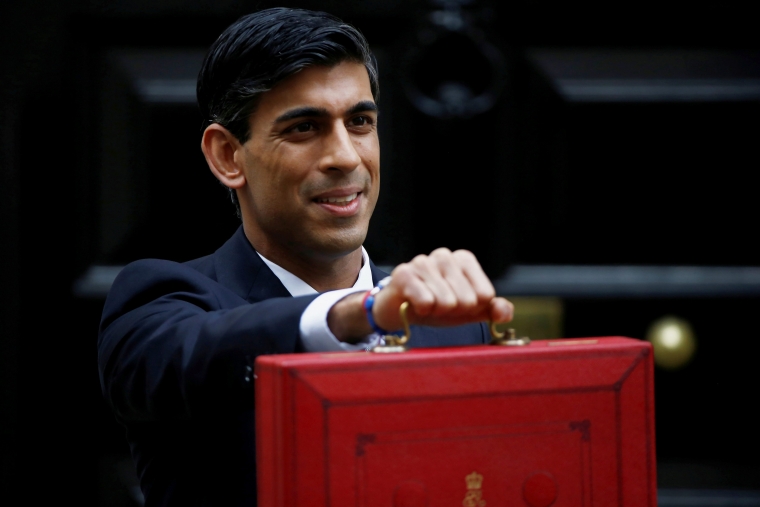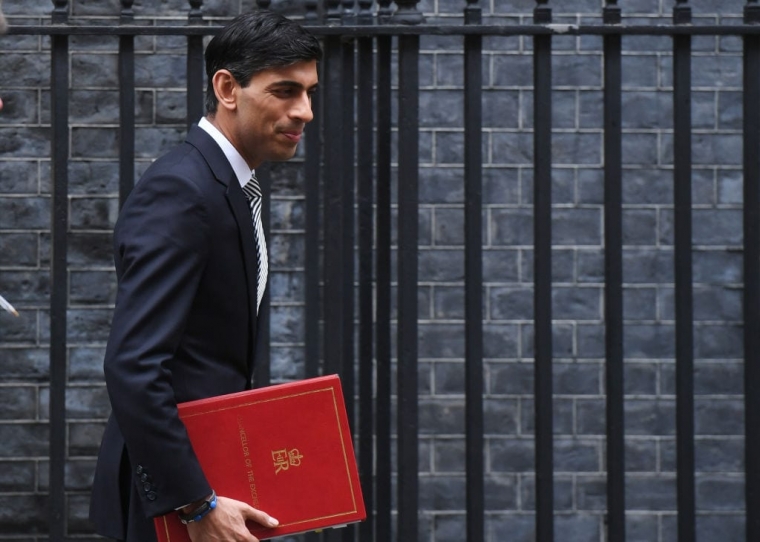Sign up for our “i on Politics” newsletter, a weekday lunchtime politics email, to receive updates on all the morning’s developments from Westminster and beyond. Sign up here from more analysis from me, Hugo Gye.
- Budget 2020 news: chancellor pledges £5bn to support NHS through coronavirus outbreak
- The Government’s coronavirus ‘three-point plan’ in full
- Business rates abolished for half of UK businesses
Today’s Budget statement turns on the spending taps, turning the page on the era of austerity as Rishi Sunak borrows Labour’s clothes.
The new Chancellor was appointed less than a month ago, but his assured delivery on the Commons floor has drawn plaudits from across Westminster already.
He has just presented a big-money Budget, with a fiscal stimulus of £30bn – and a hefty increase in Government borrowing to go with it.

But despite the Tories’ plans for “levelling up”, and Boris Johnson‘s desire to stamp his authority on the new era, this Budget was of course overshadowed by the global coronavirus crisis.
Mr Sunak started his speech by addressing the disease, saying: “We are clear that this is an issue above party. We will do right for you and your family.” But he added: “Let me say this – we will get through this together. The British people may be worried, but they are not daunted.”
The Chancellor said the NHS would get a blank cheque to deal with Covid-19, promising to give the health service whatever extra funding it needs “whether it’s billions of pounds or millions of pounds”.
In a bid to tackle fears that workers could lose out if they fall ill in the current weeks, Mr Sunak said that anyone forced to self-isolate will get statutory sick pay while individuals can now obtain a sick note from 111 rather than their GP. And Universal Credit will be more easily available with the scrapping of the “minimum income floor” and no need to attend job centre appointments in person.
There is also support for small businesses which may struggle to deal with the economic impact of coronavirus. Companies with fewer than 250 employees will see their sick pay bill footed by the Treasury; the Government will guarantee loans of up to £1.2m for small firms; business rates are cut to zero for SMEs in the hospitality and leisure industry; and 700,000 companies will get a simple handout of £3,000.
The increased public spending is not accompanied by significantly higher taxes, after Mr Sunak dodged tricky decisions such as ending the freeze on fuel duty. The Chancellor insists that, for now at least, he can stick to the existing fiscal rules but will review them at the next Budget.
According to the Office for Budget Responsibility, the stimulus will increase GDP growth – although this argument was not embraced by the Conservatives during the austerity years. However, growth is forecast to stay below 2 per cent for the next five years, hardly the performance of an economic powerhouse.

And as we burrow into the small print of the Budget, there are likely to be some nasty surprises. Already some have pointed to a new “boiler tax” which will make gas heating more expensive, and it’s a near-certainty that more unpopular measures will emerge in the hours and days to come.
Health: Big promises, short on details
i‘s health correspondent Paul Gallagher writes: Public services are “well prepared” to deal with the “key challenge” facing the nation, the Chancellor said as the number of coronavirus cases increase steadily around the UK. The Government’s public health strategy centres around giving the NHS “whatever it needs”, such as more research funding as the search for a vaccine against Covid-19 continues, yet there was little further detail forthcoming.
Health service staff have pointed to the impact a decade of austerity has had on staffing, beds, and other areas. It will take more than a short-term injection of cash to start reversing trends that have become the norm – of rising operation waiting lists and hospitals operating at full capacity all year round – should hospitals become even more overwhelmed in the coming weeks.
Environment: Greenest Budget for years
i‘s science & environment correspondent Tom Bawden writes: While the Government may have postponed a major announcement on investment in the environment, which had been due today, it did unveil a welcome series of initiatives. These ranged from multi-billion pound increases in flood defence and repair spending to £800m of funds to develop carbon capture and storage technology, which is seen as key to tackling climate change by sucking the CO2 produced by power stations out of the sky and pumping it underground. Together with £1bn to promote and develop green transport, a £640 nature-for-climate fund and the introduction of the previously announced tax on plastic packaging, this looks to be the greenest Tory budget for some time.
Technology: A step forward for broadband and 4G
i‘s technology correspondent Rhiannon Williams writes: The Government’s £5bn commitment to roll out high-speed broadband to remote areas in the UK will be much welcomed by the millions of homes with little or no internet access. Gigabit broadband, touted as being 40 times faster than standard connections, will be made available to the 5m homes and businesses that are hardest to reach, alongside increasing 4G coverage to 95 per cent in the next five years.
The Government’s repeated assertions that the UK is at the cutting-edge of technological development is often undermined by our poor connectivity record. Given that 5G is becoming more widely available across the UK since it was first switched on in May last year, that fact the UK is still struggling to provide some areas with 4G is lamentable, but today’s pledge is nonetheless a step in the right direction – particularly for those in rural locations.
The North: More devolution at last

i‘s northern correspondent Dean Kirby writes: Boris Johnson’s promise to “level up” the UK merited three mentions in Rishi Sunak’s Budget speech as he made the long-hoped-for announcement that West Yorkshire would be given its own metro mayor. Making a bold promise to “get things done”, the Chancellor announced a major devolution deal for the region that some feared might never happen. It’s huge news for the region and comes a full six years after rival Greater Manchester signed its own deal with the Government.
In another big announcement, the Chancellor also said metro mayors would get London-style funding settlements. The North will also get its own “economic campus” with 750 staff from the Treasury and other Whitehall departments as part of a plan to move 22,000 from Whitehall. Other positives for the north included the reaffirmation of the Government’s support for the high-speed rail link between Manchester and Leeds and £200m to support flooded communities.
Education: More cash for FE colleges
i‘s education correspondent Will Hazell writes: Rishi Sunak confirmed an increase for school funding first announced by the Government in August. But as expected, the big education announcement in the Budget related to further education. The Government sees boosting FE as a key way to revitalise local economies and extend opportunity in the “Blue Wall” seats in the Midlands and North which the Tories picked up at the general election. Mr Sunak announced £1.5bn over five years to upgrade the FE college estate across the country. Recognising that FE was a personal priority of Sajid Javid, Mr Sunak namechecked his predecessor as Chancellor, saying: “Saj, we’re getting it done”. The Budget also contained the eye-catching decision to abolish VAT on digital publications, dubbed “the reading tax”.
Leisure: Bottoms up for drinkers
i‘s consumer affairs correspondent Katie Grant writes: In a move sure to go down well with drinkers, as well as struggling pubs and restaurants, Mr Sunak announced that a planned rise in beer duty would be scrapped – and that he would also be freezing duty on wine and cider. The decision to has received a mixed response – the hospitality sector has hailed it as “great news” while health campaigners have branded it “a travesty”.
The British Beer and Pub Association, which has campaigned for beer duty to be frozen said the decision was ”great news for pubs and pub goers”, and would save the industry “millions of pounds” and protect “thousands of jobs”. But Professor Sir Ian Gilmore, Chair of the Alcohol Health Alliance, pointed to research suggesting that successive governments’ decisions to cut or freeze alcohol duty since 2012 have led to “almost 2,000 additional deaths and £314m extra costs to our already overstretched NHS services”.
Science: Blue sky thinking
i‘s science & environment correspondent Tom Bawden writes: The Government has long talked about its commitment to science after Brexit. Today it followed through on its claims. Research and development investment will more than double to £22bn a year – a bigger increase than expected – while £900m will be made available for electric vehicles, space and nuclear fusion projects. A further £1.4bn will go to a science institute at Weybridge, that is currently working on the coronavirus, with £800m for an agency to promote “blue sky” research – exploratory science without initial “real world” applications.

